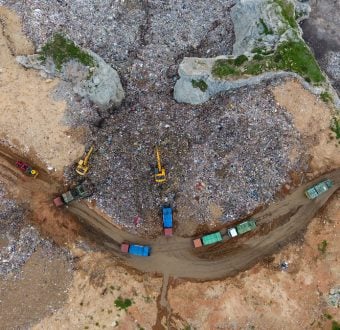Unilever recently announced it will use phone tracking data to monitor its palm oil supply chains. This is a false solution. This type of geo-location technology, which uses cell phone location data, is not going to put an end to deforestation nor the forms of exploitation tied to the agricultural commodities trade.
Big data-driven processes do not address the core problems of production that are intrinsically tied to forest destruction, land theft, corruption and human rights abuses.
This is yet another example of corporations using private sector, voluntary measures to obscure what they truly are doing—bringing us closer to climate and biodiversity catastrophes.
Palm oil production remains a leading driver of deforestation along with all of its human rights, climate, and ecological impacts. The only thing to reverse the negative impacts of commodities trading, including the palm oil trade, is for companies like Unilever to stop buying raw materials that come from draining peatlands, setting a blaze and bulldozing forests.
Fires are intentionally started to clear land for palm oil and pulp & paper plantations. They release a massive amount of greenhouse gas emissions that go unaccounted for by industry. Greenpeace International calculated that between 2015 and 2018, emissions from peatland fires attributed to the plantation sector amounted to 427 megatonnes of CO2, a total equivalent to the average annual emissions of 110 coal-fired power plants or 91 million cars. According to UNICEF, in 2019, Indonesia’s annual fire crisis exposes 10 million children across the region to deadly air pollution.
In 2019, alone,1.6 million hectares of tropical forest and carbon-rich peatlands in Indonesia burned, in many cases to make way for pulp & paper and palm oil plantations, linked to the global market and companies such as Unilever. Over the last two decades, the palm oil sector has driven the deforestation of millions of hectares of forests, habitats and peatlands across Indonesia, Malaysia, Africa and South America. As numerous reports from Greenpeace and other NGOs show, major producer groups within Indonesia supplying the global trade continue to be linked to deforestation, fire and human rights abuses.
Real transparency for any company sourcing commodities such as beef, palm oil, soya or timber means requiring as a condition of trade that suppliers make publicly available full information on both their land holdings and origins of the commodities they supply.
Living up to zero deforestation commitments and the global climate and biodiversity crisis means that companies must only buy commodities from supply chain actors that they prove – through public accountability platforms – are clean, even if this means reducing the volumes bought.
Using data from phone signals on movements to track where commodities are coming from introduces critical questions about the shortcomings of how this type of technology can truly tackle deforestation. How this data will inform Unilever’s decision making and ensure transparency and traceability in its supply chains remains unclear to its consumers and other stakeholders.
The company has proven it cannot follow through with its commitments to end deforestation and its palm oil supply chain remains connected to fires, peat and land clearing. Earlier this year Unilever admitted it would fail to meet its 2020 deforestation commitments and has now moved the target to 2023.
All over the world, we are seeing that the impacts of the climate and biodiversity crisis and companies like Unilever are directly connected. By continuing to do business with forest destroyers, Unilever is fueling the climate crisis. The more forests we lose to runaway land-use expansion, the more carbon in the atmosphere is released, and one of the most powerful natural solutions in fighting the climate emergency is gone forever.



